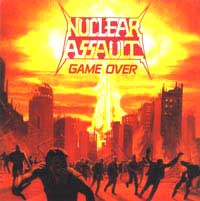Nuclear Assault - Game Over/The Plague
Review: Perhaps the most nihilistic and raw of the otherwise still caught-in-convention blues-based speed metal bands, Nuclear Assault integrated elements of thrash and progressive tendencies into otherwise disturbingly rapid and basic metal that changes with the tendon-muscle coordination of human motion. This compilation of their earliest works demonstrates their sound at its most direct and fully-conceived point, while other works became more refined and violent.
Raw scuffing of guitar in coordination with a galloping drum initiates most songs and provides the mainstay of driving introductory verses, often pairing with a more spacious beat over which a melody of three notes or under self harmonizes. This alternation between the rudiments of sound and aspects of rising beauty in chaos fuels a conflict across the album that summarizes the hopes and fears of 1980s cold war Amerika.
Of note is Glenn Evans on percussion, who makes subtle but direct supporting beats integrate with layers of guitar and bass in a style reminiscent of John Bonham, and the guitar exploration of John Connelly and Anthony Bramante. A teenage Dan Lilker (now of Brutal Truth, Ravenous) on bass propels the music with constant throbbing motion. In the tendency of most bands in the time, themes in songwriting explode through the integration of instrumental lines providing solidarity for soloing and structural change.
Willing to alter song structure as well as use nihilistic one-chord rhythm work alongside far more complex material, Nuclear Assault refined the riff formation of speed metal bands such as Metallica and Anthrax into a sense of mechanism-building that emphasized factors more present in classical composition such as relative motion, implied harmony and recursive structure. They did not fully leave behind heavy metal rock/blues-based music, but generated a sense of greater atmosphere through complex motion culminating in stark resolving motion, with the grandeur and epic style of original metal artists Black Sabbath.
